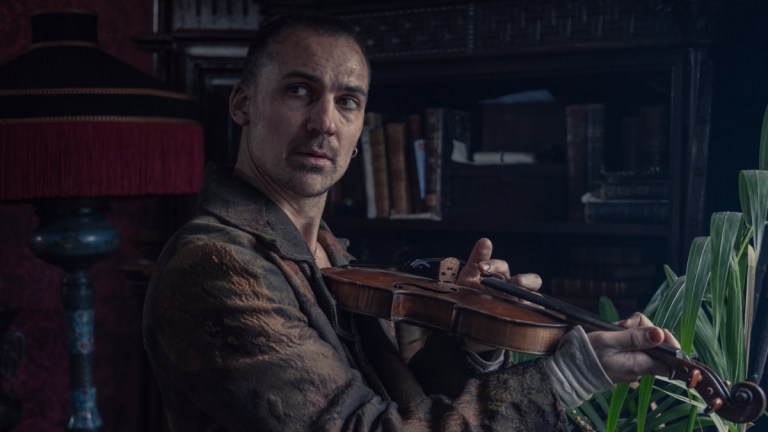Did The Irregulars Need its Sherlock Holmes and Watson Connection?
Perhaps The Irregulars needed a Sherlock Holmes link to get made, but its emotional, supernatural story could easily have stood alone

Warning: contains some plot details for The Irregulars
There are Sherlock Holmes purists in this world, but I’m not among them. You want to put Sherlock Holmes on a spaceship, or make him a quarterback, or a hedgehog, or a woman? Go for your life. Make him Elton John for all I mind. Just show me a Sherlock who uses genius powers of observation and deduction to solve unsolvable crimes in whatsoever context, with whatsoever number of claws, X chromosomes or Top 10 hits and we’re good.
The cases are the thing. As long are there are brilliantly devised deductions delivered by a rationalist whose knowledge of the chemical make-up of a particular brand of cigar ash proves that yes, it was the uncle all along, then that’s Sherlock Holmes, whatever the wrapping.
Despite having all the wrapping, The Irregulars – the new Netflix series set in the Holmes universe – isn’t very Sherlock Holmes at all. Yes, it takes place in the late 19th century around 221B Baker Street. It has a case-of-the-week structure – at least to begin with. It features characters named Dr Watson, Mrs Hudson, Inspectors Gregson and Lestrade, as well as Sherlock Holmes and his brother Mycroft. It’s inspired by the Baker Street Irregulars, the network of homeless kids used by Holmes in the original stories to seek out information and run errands. All this, and still the final product isn’t particularly Holmesian.
To some extent, that’s because it’s not about Sherlock Holmes. It’s about the gang of teenagers hired by Dr Watson to help investigate a series of unusual happenings in London. Holmes doesn’t even show up until halfway through. When he does appear, he’s nursing personal pain and far from the Great Detective of reputation.
New stories are expected to take liberties with established characters, but The Irregulars makes its Holmes so unrecognisable that you may question why he has to be Holmes at all. Given another name, Henry Lloyd Hughes’ chaotic, tortured character would function every bit as well in the story, without risking the disappointment of Conan Doyle fans who’ve turned up to see a new take on a beloved and familiar creation.
The same goes for Royce Pierreson’s Dr Watson, here reimagined as a shadowy villain hiding a secret. Devotion to Sherlock aside, there’s barely a scrap of John Watson in him. Nor is there much evidence of Holmes’ distinctive deductions across the series. Come to The Irregulars expecting the Holmes universe and you’ll likely leave frustrated.
That’s partly because the very genre of the series is at odds with the world created by Arthur Conan Doyle. The Irregulars is a supernatural show. It’s about a psychic girl who, along with her sister and friends, track down the super-powered culprits behind odd occurrences in London. Bird men, tooth fairies, hypnotic sirens, a shape-shifter, a Dr Frankenstein-like collector of body parts… It’s aiming to be a Victorian Misfits slash Buffy slash Stranger Things about a teenage Scooby Gang hired to investigate what is giving monstrous powers to ordinary people.
Though a persistent presence in associated fan fiction, the supernatural genre is essentially in conflict with the Holmes universe. Despite Conan Doyle’s own well-documented interest in spiritualism and the search to communicate with the afterlife, his Holmes stories were set in a world in which every unlikely occurrence has a rational explanation. The cursed devil hound killing off aristocrats on a Devonshire moor moor? Just a dog and an inheritance swindle. The blood-sucking vampire in Sussex? All down to a jealous step-brother. Bringing monsters and alternative dimensions into Holmes’ world lessens his own superpower. As Holmes famously put it in that last story, “The world is big enough for us. No ghosts need apply.”
Even forgetting ghosts, The Irregulars is truly driven by something rarely prioritised in the Holmes universe: emotion. Above anything else, the series is about how its characters feel, how they deal with their feelings, and how they relate to each other. That’s why, after a patchy start that veers unevenly in tone between children’s drama and adult horror, it’s able to build to a satisfying conclusion filled with affecting emotional resolution.
The Irregulars has its own mythology and empathetic approach to its monsters. None is an arbitrary villain. After investigation, they’re all found to be grieving a loss of some kind and warped by their new-found powers. Using telepathy to enter their minds and find the root cause of their pain, the gang comes to understand what drives them. These mysteries aren’t solved using rational observation, but its sort-of opposite: psychic power, or extreme, supernatural empathy if you like. It’s all about the heart, while Holmes is all about the head.
Why then, have a Holmes link at all? If the entire story of The Irregulars could have stood alone and lost nothing from dropping the Conan Doyle connections, why risk disappointing some?
We all know the answer to that. It’s the same reason we see ice cream vans painted with unlicensed approximations of popular Disney characters and cinema screens showing diminishing return sequels. Franchise recognition is where it’s at, and plays a huge part in getting TV shows commissioned, made and seen.
Commissioners and audiences alike are comforted by familiarity. There are so many new titles on so many platforms that original stories can sink without being hooked to an existing fandom. The Irregulars story may work perfectly well with its Sherlock Holmes links removed, but the likelihood is, we’d never have seen it without them.
It may be useful to weld a new story to an old property then, but there are drawbacks. It forces the new thing into making a promise it often can’t deliver on. There’s undoubtedly an audience out there for The Irregulars, but it may not be found by looking among fans of Sherlock Holmes. Until viewers and commissioners – and yes, entertainment websites – prove more willing to take risks on entirely new creations, this won’t be the last time that an established fandom clashes with a new take on the thing it loves.
The Irregulars is streaming now on Netflix


